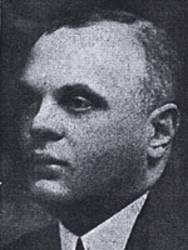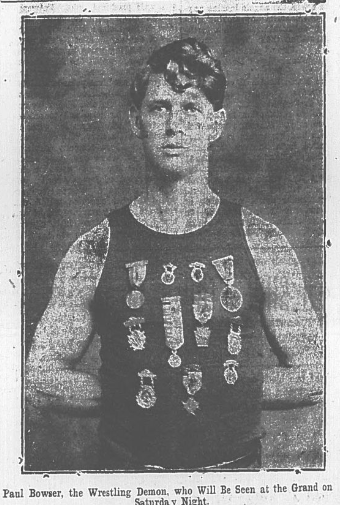Antaŭenigante Luktado
Luktado evoluis en sportekspozicion de legitimaj konkursoj pro du kialoj. Mi multe skribis pri la unua kialo. Leĝaj konkursoj inter same lertaj luktistoj ofte estis longaj, enuigaj aferoj kun malmulte da ago. Tiuj konkursoj malŝaltis adorantojn kaj malhelpis profesian luktadon eksplodantan kiel spektsporto.
Mi ne tiom skribis pri la dua kialo. The emergence of powerful promoters in large cities or areas in the United States in the late 1910s and early 1920s. Once political connected business owners took over the sport, the business owners wanted to control all aspects of the sport including the wrestler who carried the world championship.

Photo of Jack Curley from 1910 (Publika Domajno)
During the first couple decades of the sport, local sporting men often served as promoters by securing a venue for a match that they wanted to see. These backers often took a bath on the event because crowds numbered in the hundreds. The spectators did not generate enough revenue to pay the wrestlers or cover the rent for the venue.
The Edwin Bibby vs. Joe Acton match in 1882 is an example of this promotional arrangement. Local New York sporting men put up the money to rent Madison Square Garden. Bibby defended the American Heavyweight Wrestling Championship in front of three hundred spectators. The paying crowd did not come close to paying for the venue much less reimbursing the sporting men for the $350 winner’s purse. The backers took a large financial loss.
Inter 1890 and 1910s, the wrestler’s manager also served as a quasi-promoter in lining up backers and venues for big matches. Je 1910, Frank Goth’s manager, Emil Klank, arranged with Chicago’s Empire Club for the club to secure a venue for Gotch’s title defense with Stanislaus Zbyszko.
Gotch demanded sixty percent of the gate receipts. The Empire Club took thirty-five percent leaving Zbyszko with only five percent of the gate.
In the early 1910s, local business men began opening promotions in the larger cities and towns. Jerry M. Walls may be the first regular promoter of a town. He managed Ed “Strangler” Lewis during Lewis’ time in Kentucky. Walls gave Lewis his name as Lewis previously wrestled under his real name, Robert Friedrich, or Fredrick.

Photo of Paul Bowser as a wrestler in 1914. He promoted professional wrestling in Boston for several decades. (Publika Domajno)
Walls promoted Lexington, Kentukio, his hometown and Louisville, Kentukio, Inter 1913 Kaj 1915. Lewis regularly main evented these cards.
When Lewis left for New York with a new manager, Billy Sandow, Walls quit promoting both wrestling and boxing. I cannot find any reference to him after 1915.
Jack Curley set himself up as the first big city promoter, when Curley opened his promotion in New York City during 1915. Curley partnered with Sam Rachmann on Rachmann’s fall version of the 1915 Nov-Jorko Internacia Luktada Turniro.
Originale, Curley promoted boxing and wrestling. Tex Rickard squeezed Curley out of boxing, so Curley focused on professional wrestling. Using his political connections and control of the biggest potential market in the country, Curley soon controlled the world championship.
De la frua 1920aj jaroj, Paul Bowser set up his promotion in Boston. Tom Packs controlled St. Louis. Other regional promoters opened promotions in large to mid-size cities throughout the United States and Canada. These promoters wanted to control everything in professional wrestling, so they effectively ended legitimate contests. The only legitimate contests after local promotions appeared were double-crosses or agreed upon contests to settle promotional differences. Legitimate professional wrestling ended in America.
Vi povas lasi rimarkon aŭ demandi demandon pri tio ĉi aŭ ajna poŝto sur mia Facebook paĝo.
Fontoj: La Nov-Jorkaj Tempoj, Aŭgusto 8, 1882, P. 2, Stela Tribuno (Minneapolis, Minesoto), Februaro 15, 1910, P. 10 Kaj The Lexington Herald, Julio 1, 1913, P. 9

